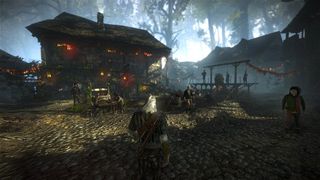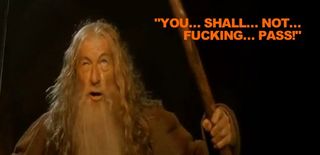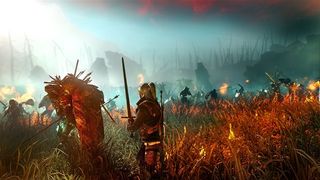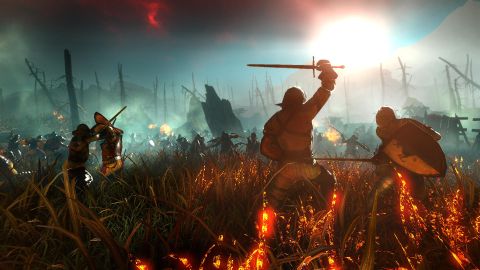Why you can trust GamesRadar+
Geralt’s world is a mire of fear, poverty, racial inequality, political maneuvering and religious fanaticism. Tensions between humans, mages and “nonhumans” - elves and dwarves - are always high. Most NPCs look dirty and malnourished (with some even showing scars and other disfigurements). Geralt is no knight in shining armor, either. His help always comes at a price and you’re rarely given the option to simply aid someone out of the kindness of your heart. I’m not saying that you’re going to need to pop some Zoloft if you want to play this game, but The Witcher 2’s world definitely isn’t a very happy place.

Above: Public executions really bring the community together
As the game spends the majority of its time focusing on the absolute lowest rung of society, it stands to reason that the majority of the people you meet will use all sorts of colorful language. What’s truly impressive, however, is that the game never comes across as vulgar or stupid with all the F-bombs flying around. On the contrary, The Witcher’s use of language is incredibly intelligent as it creates a much more sincere depiction of the lower classes. Nonetheless, this is sure to be a divisive issue for some role-playing gamers (even though it shouldn’t) as some believe contemporary curse words have no place in high fantasy (e.g. Gandalf would never say “fuck”). If you feel a little unsure of where you stand on all this, I’ve arranged a series of images to help you out.



If you found any of the above images overly offensive, The Witcher 2 probably isn’t for you.
Out with the old, in with the new
The business of witchering has changed quite a great deal since last we saw Geralt. You still sport an iron sword for humanoids and a silver sword for monsters and specters, but that’s really all that remains unchanged. Gone are the strong, quick and group sword stances along with the timed mouse-clicks that governed the melee combat in the original in favor of a simpler system of faster weaker strikes and stronger slower strikes. Coupled with a dive-roll ability, you can unleash strings of both light and strong blows and then dive out of combat to avoid any reprisals. This creates a combat system that’s much more action-oriented and reaction-based.
You’re also capable of using multiple Signs (magic attacks) on the fly during combat thanks to the new combat menu. The combat menu is a particularly stylish feature that slows the action to a snail’s pace as you skim through your Signs, traps, bombs and other combat items while effectively keeping you in the moment. Using his witcher’s Signs, Geralt can incinerate foes with exploding balls of flame, set up protective electrical barriers, send out a wave of pure force and much more. What’s even more badass is that some of these Signs can be used to influence dialogue interactions with NPCs. For instance, the Axii Sign, which is used to control the minds of your enemies, can be used to extract information from unhelpful NPCs during conversations like you’re some medieval monster-slaying Jedi.

The alchemy system still stands out as the most unique and defining aspect of gameplay in The Witcher. As you move about the game world, you will collect ingredients from dead monsters, as well as various flora and fauna, to concoct magical potions, oil coatings for your swords and grenades. Believe me when I say that you’ll come out of most battles not knowing your head from your ass if you aren’t staying properly hydrated. Aside from providing basic support such as increased health regeneration, the various mixtures that Geralt brews can also increase his resistances to negative effects such as poison, flame or magic while increasing his own magical prowess and physical strength.
Likewise, particular monster breeds are weak to certain status effects, as well; for instance: nekkers are incredibly weak to weapons that cause the Bleeding status effect, so an intelligent player would take the time to brew and coat his silver blade with Brown Oil before attempting to clear out an entire den of the little bastards. You can stack three potions on yourself, but stronger potions have higher toxicity, so you might be able to only use a couple strong ones at a time. This simplifies the system a bit from the first game (for good or for ill, depending on how you look at it). The only other change in the system is that you no longer need to find an inn or a campfire to start brewing; you simply need to be out of danger.

Witchering and wandering
Leveling Geralt has become a simpler process due to a much more narrow selection of areas for advancement. Each level will reward you with one ability point that can be spent in Signs, Alchemy or Swordplay. Don’t worry, though. These three specializations are so chock full of unlockable abilities that it’s literally impossible to max out more than one branch in a single playthrough. For instance, the Swordplay branch contains abilities such as parries, ripostes and stun attacks. Specializing in Signs will grant you greater range and area of effect properties, while sinking points into Alchemy will increase both the potency and amount of potions you can drink. There are no specific builds that can be considered better than others; instead, players are encouraged to invest in specializations that supplement their preferred playstyle whether it’s a sword-swinging badass or an introverted geek who just loves to play with his chemistry set. Why more games aren’t made like this is beyond me.
More info
| Genre | Role Playing |
| Description | Truly a labor of love, this amazing sequel fortifies the foundations laid down by a flawed classic and creates a brilliant masterpiece. Visceral combat, dizzying player customization and a truly immersive story all come together to create one of the best role-playing experiences of the year. |
| Platform | "Mac","PC","Xbox 360" |
| US censor rating | "","Mature","Mature" |
| UK censor rating | "","","" |
| Alternative names | "The Witcher 2" |
| Release date | 1 January 1970 (US), 1 January 1970 (UK) |

